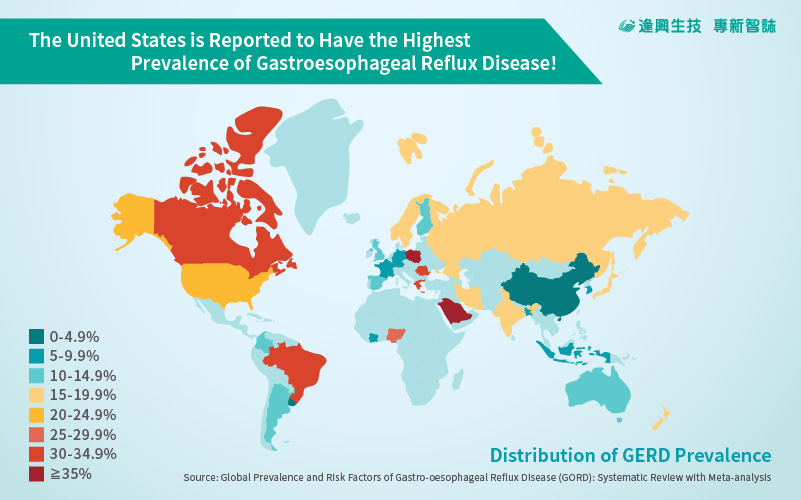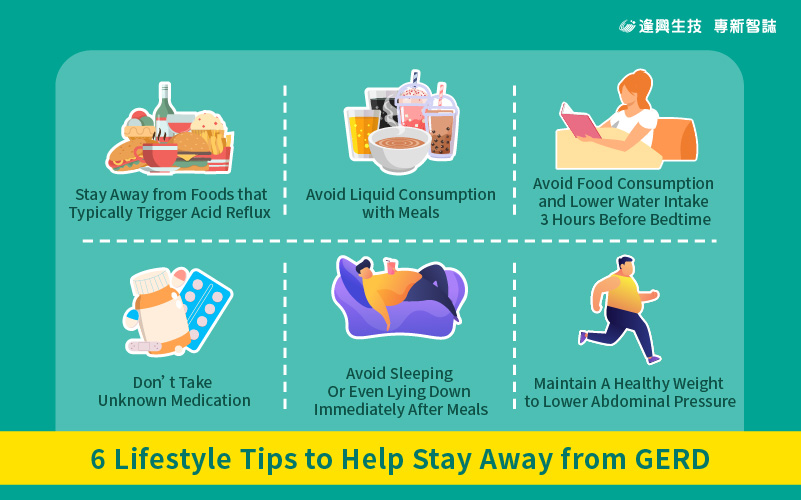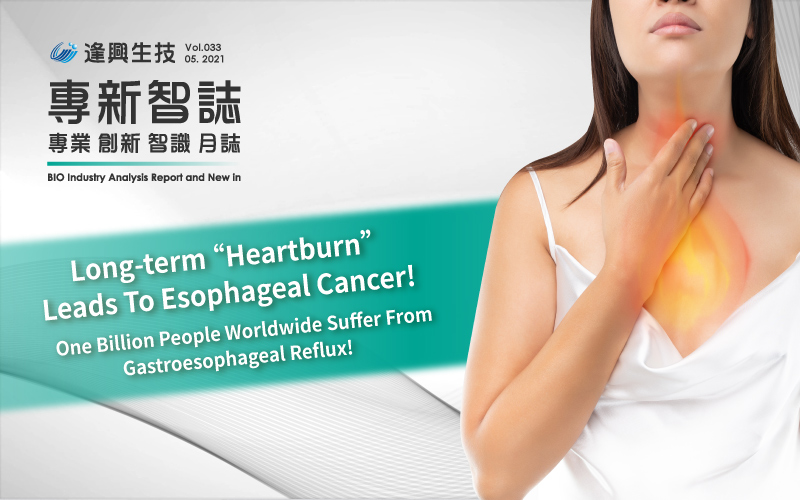GI Health Issues Rank No.1! GERD Causes A Significant Economic Impact!
Fast-paced lifestyles, irregular daily routines result in many digestive problems and even GERD. More and more people need GERD solutions. According to Ministry of Health and Welfare, Taiwaneses consume on an average of 185 tonnes of gastrointestinal medicine powder which is equivalent to the height as 1600 Taipei 101. The internet research data shows that GERD is the most searched digestive condition. Everyone has been actively looking for ways to relieve their conditions and the recommendation range from digestion-promoting diets to digestive health supplement. The number of GERD-related searches keeps going up, reflecting more and more people are in need of effective treatment.
Furthermore, many research reports indicate that nearly 15% of the world population are suffering from GERD. The prevalence rate in Asia keeps increasing annually and the rate for Taiwan is estimated to be 16% which is well above average.

However, the condition seems to be worse in Western countries. One in every five of the European and American citizens experiences GERD and the rates increase about 0.5 to 1% every year. Such a high prevalence rate has a negative impact on the economy worldwide by generating considerable amounts of medical cost. For instance, the direct medical treatment costs UK approximately 760 million pounds each year, 24 billion dollars for the United States, and 112 U.S. dollars for every six patients in Iran.
The persistent increase of GERD prevalence and online discussion over digestive issues not only show how much consumers actually care about their digestive health, but also indicate that with the substantial amount of medical costs, GERD is indeed a global health issue that requires immediate attention.
GERD Turning Into Barrett’s Esophagus Increases The Risk Of Esophageal Cancer!
The lower esophageal sphincter (LES) is a critically important valve between the esophagus and the stomach, which remains closed the majority of the time, preventing acid reflux and the swallowed food from moving back up. However, LES may begin to fail over time, leading to acid damage of the esophagus, a condition called GERD. GERD is often accompanied by the symptoms such as heartburn, chest pain, and the sensation of a lump in your throat which may last for a few hours. These symptoms may come together with abdominal bloating, a sour and bitter taste in your mouth, a chronic cough, and etc.
An endoscopic assessment of the esophagus is used to check for the presence or absence of GERD and according to The Los Angeles Classification, there are four grades. Grade A: One or more mucosal break ≤ 5mm that does not extend between the tops of two mucosal folds. Grade B: One or more mucosal break ≥ 5mm that does not extend between the tops of two mucosal folds. Grade C: One or more mucosal break that is continuous between the tops of two or more mucosal folds, but that involves ≤ 75% of the circumference. Grade D: One or more mucosal break that involves ≥ 75% of the esophageal circumference.
In order to improve the condition of esophageal mucosal damage brought by gastric juice, many people tend to take antacids to suppress the excessive gastric juice production. Nevertheless, long-term administration of antacids may lead to inadequate gastric juice secretion, poor absorption of nutrients, gastrointestinal bacterial overgrowth, and higher chance of getting infected. In addition, antacids contain some components which may trigger gastrointestinal problems. For instance, aluminium often causes constipation and magnesium may cause diarrhea. Therefore, it is highly recommended to seek medical advice first to prevent further damage to the stomach.
Furthermore, long-standing GERD would increase the chance of developing Barrett’s esophagus, the condition that esophagus gets damaged by acid reflux and the lining becomes thick and red. 50% of the esophageal cancer are associated with Barrett’s esophagus; however, there are little to no symptoms during the initial stage and the success rate of surgery is 15 to 30% only. Therefore, maintaining healthy lifestyle habits and replenishing enough nutrients with gastroprotective effect are the best ways to prevent all of the aforementioned condition.
Many foods and lifestyle habits contribute to the development of GERD and here are the six main changes to prevent GERD:

1. Stay Away from Foods that Typically Trigger Acid Reflux
Try not to overeat or consume alcohol, strong tea, coffee, and spicy hotpot on an empty stomach and limit the intake of desserts, sticky rice, and fried foods to prevent excessive gastric juice production.
2. Avoid Liquid Consumption with Meals
Eating and drinking at the same time would reduce chewing, which affects digestion and causes bloating that further leads to GERD.
3. Avoid Food Consumption and Lower Water Intake 3 Hours Before Bed Time
It is highly recommended to not consume any more food after 9 p.m. since eating late affects digestion. Besides, going to sleep with food in the stomach could easily lead to GERD.
4. Don’t Take Unknown Medication
When getting sick, many people tend to purchase the over-the-counter drugs. However, some of these cold medicine contain the heat and pain-relieving components which could possibly damage the stomach lining. Thus, it is advised that the patients with GERD to only take the medications prescribed by the doctors.
5. Avoid Sleeping or Even Lying Down Immediately After Meals
Sleeping in the freefall position increases the abdominal pressure which could easily cause acid reflux. If lying down is a must, It is highly suggested to lie flat and have the bed head elevation risen at least 12 to 20cm.
6. Maintain a Healthy Weight to Lower Abdominal Pressure
Obesity increases abdominal pressure which triggers acid reflux. It is recommended to keep your body in a good shape with regular exercise and a healthy diet, having your BMI fall between 18.5 and 24. In addition, wearing a corset should be avoided since it only adds more pressure to the abdomen.
GERD is the result from having long-term, unhealthy lifestyle and eating habits and high levels of stress. Therefore, it is difficult to be solved in a short period of time with just a few gastrointestinal medicines. In order to prevent GERD and even more severe conditions such as Barrett’s esophagus and esophageal cancer, maintaining not only healthy lifestyle and eating habits on a regular basis, but also low stress level is the key.
References:
1. https://www.setn.com/News.aspx?NewsID=442795
2. Scientific Reports volume 10, Article number: 5814 (2020)
3. https://www.tph.mohw.gov.tw/?aid=510&pid=93&page_name=detail&type=188&iid=1632
4. Global Prevalence and Risk Factors of Gastro-oesophageal Reflux Disease (GORD): Systematic Review with Meta-analysis
https://www.nature.com/articles/s41598-020-62795-1
5. The Los Angeles Classification of Gastroesophageal Reflux Disease
https://www.sciencedirect.com/science/article/pii/S2212097113700463
Wel-Bloom’s got more secrets to improving stomach health. Please check out our next column for more details! For more information about Gut Health Supplement Market, you can visit the article: ”Long-term “Heartburn” Leads To Esophageal Cancer! One Billion People Worldwide Suffer From Gastroesophageal Reflux! -Part.02”
To retrieve passwords please fill in the form or email us at, service@welbloom.com.tw, and our sales representative will get in contact with you as soon as possible.
Wel-Bloom Bio-Tech, experts in dietary supplement foods research and development in Taiwan
